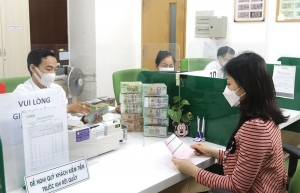Confusion compounded by consumer finance apps
Nguyen Hoang Minh, head representative of the Vietnam Banks Association in Ho Chi Minh City, shed light on the current state of the financial sector in the country.
 |
| Confusion compounded by consumer finance apps, illustration photo/ Source: freepik.com |
“A total of 70 per cent of consumer finance companies have reported being subjected to regulatory checks, with no conclusion reached as yet,” he said at a conference in Ho Chi Minh City earlier April. “The consumer finance sector in Vietnam is facing numerous challenges, including issues with debt collection activities, negative perceptions of legitimate companies, and a lack of direct regulatory oversight for debt trading companies.”
Currently, there are 16 licensed companies under the State Bank of Vietnam (SBV), while unlicensed apps have proliferated, causing adverse effects on legitimate companies, leading to confusion and misperceptions of legal financial services.
Even legally sanctioned consumer finance companies, which have been granted permits for management, are being conflated with illegal lending practices.
Lending and debt recovery activities in Q1 have shown minimal growth, with some financial companies experiencing a decrease in both lending and debt recovery. In contrast, during 2016-2022, financial companies demonstrated robust growth, with annual growth rates of 19-20 per cent.
Le Quoc Ninh, consumer finance chairman at the Vietnam Banks Association, also expressed concern about the challenging environment facing consumer finance companies, particularly after negative reports emerged about unlicensed finance companies. These companies are often not subject to the supervision of the SBV.
According to Ninh, recent issues with debt collection activities by certain consumer lending and pawnshop chains have resulted in investigations by law enforcement agencies, impacting the reputation of legitimate consumer finance companies.
“Many of these companies are now being associated with other types of consumer loans, and some are being mistakenly labelled as loan sharks,” Ninh said. “After local authorities launched a criminal investigation into two well-known debt collection companies, there has been a trend of individuals defaulting on their debts and evading payment. This trend is becoming increasingly prevalent across the consumer finance sector.”
In recent times, several commercial banks have started openly selling consumer loan debt, signalling the emergence of a debt trading market in Vietnam. This is deemed a positive sign, as credit institutions often sell off smaller debts, including consumer loans, to avoid the hassle of managing them.
Financial expert Nguyen Tri Hieu has recommended the establishment of a consumer loan debt trading exchange in Vietnam. While the country already has a debt trading market for businesses managed by the Vietnam Asset Management Company, there is currently no platform for trading consumer loan debts. Therefore, it is imperative that the SBV provides direction for such an exchange.
“Additionally, education on financial literacy should be provided to the public through mass outreach programmes to equip individuals with the knowledge and skills necessary to navigate the complexities of the consumer finance sector,” Hieu said.
Ngo Xuan Duy, legal director at the International Debt Trading Company of Vietnam, has highlighted legal issues for companies operating in the debt trading sector. While circulars issued by the SBV directly regulate credit financial institutions, there are no specific regulations for debt trading companies.
“We recommend a clearer legal framework that can regulate not only credit organisations but also debt trading companies. For example, we are unsure about what constitutes proper debt collection practices, such as making debt collection phone calls,” Duy said.
“We have also faced difficulties in litigation against delinquent borrowers in court. The perspective of the judiciary has not been favourable towards this segment, and debt trading companies have had to provide extensive explanations despite following the regulations.”
Duy’s remarks highlight the urgent need for a well-defined legal framework for debt trading companies in Vietnam. He has called for regulations that go beyond credit organisations and specifically address the unique challenges and complexities of debt trading. By providing clear guidance on debt collection practices and legal proceedings, a robust legal framework can support the growth and development of the debt trading industry in Vietnam.
Tran Thi Khanh Hien, head of Research at VNDirect, told VIR that the current challenging environment would likely deter foreign investors.
“This sector may face further obstacles in attracting foreign investors, owing to concerns surrounding the legal framework and economic instability. These challenges have the potential to limit growth and expansion in consumer finance companies across the country,” Hien said.
 | Central bank cuts policy interest rates to spur growth The State Bank of Vietnam (SBV) announced it would reduce several policy interest rates from April 3, the second cut within one month, the regulator announced on its website March 31 night. |
 | Vietnam’s banking system shows signs of money surplus Vietnam’s banking system is showing signs of returning to a period of money surplus as no bank needs the State Bank of Vietnam's (SBV) capital in the open market operation (OMO) channel and overnight interbank interest rates have dropped sharply. |
 | Central bank pushes for rule alignments The State Bank of Vietnam last week sought amendments and supplements to rules relating to the purchase of shares in Vietnamese credit institutions by foreign investors. |
 | Lenders to benefit in SBV debt reposition The State Bank of Vietnam’s fresh set of policies are anticipated to ameliorate the financial strain faced by both creditors and debtors, as well as establish a robust legal framework for debt restructuring to be allocated over a two-year period. |
What the stars mean:
★ Poor ★ ★ Promising ★★★ Good ★★★★ Very good ★★★★★ Exceptional
Related Contents
Latest News
More News
- Raised ties reaffirm strategic trust (February 20, 2026 | 14:06)
- Sustained growth can translate into income gains (February 19, 2026 | 18:55)
- The vision to maintain a stable monetary policy (February 19, 2026 | 08:50)
- Banking sector faces data governance hurdles in AI transition (February 19, 2026 | 08:00)
- AI leading to shift in banking roles (February 18, 2026 | 19:54)
- Digital banking enters season of transformation (February 16, 2026 | 09:00)
- IFC to grant $150 million loan package for VPBank (February 13, 2026 | 09:00)
- Nam A Bank forms position as strategic member at VIFC through three key partnerships (February 12, 2026 | 16:39)
- Banks bolster risk buffers to safeguard asset quality amid credit expansion (February 12, 2026 | 11:00)
- VNPAY and NAPAS deepen cooperation on digital payments (February 11, 2026 | 18:21)

 Tag:
Tag:



















 Mobile Version
Mobile Version